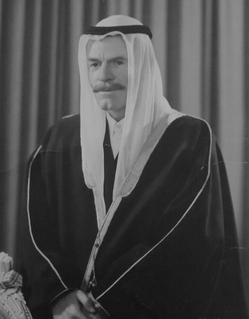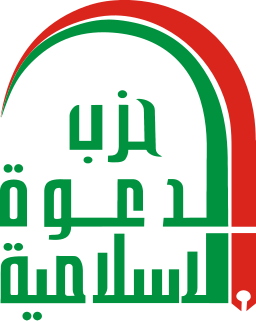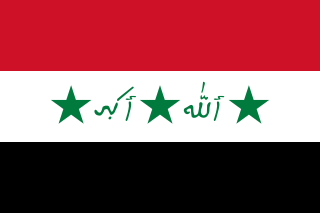
Izzat Ibrahim al-Douri is a former Iraqi politician and military commander. He served as Vice Chairman of the Iraqi Revolutionary Command Council until the 2003 U.S.-led invasion of Iraq and was regarded as the closest advisor and deputy under former President Saddam Hussein. He leads the Iraqi insurgent Naqshbandi Army.

Mohammed Amza az-Zubeidi was the Prime Minister of Iraq from 1991 to 1993. He is on the "Saddam's Dirty Dozen" list of people responsible for torture and murder in Iraq, playing a key role in Iraq's brutal suppression of the uprising of 1991. He was featured in Iraqi news film kicking and beating captured rebels.

The Islamic Dawa Party, also known as the Islamic Call Party, is a political party in Iraq. Dawa and the Supreme Islamic Iraqi Council are two of the main parties in the religious-Shiite United Iraqi Alliance, which won a plurality of seats in both the provisional January 2005 Iraqi election and the longer-term December 2005 election. The party is led by Haider al-Abadi, who has been Prime Minister of Iraq since 8 September 2014. The party backed the Iranian Revolution and also Ayatollah Ruhollah Khomeini during the Iran–Iraq War and the group still receives financial support from Tehran despite ideological differences with the Islamic Republic.

Ayatollah Mohammad Baqir al-Hakim, also known as Shaheed al-Mehraab, was a senior Iraqi Shia cleric and the leader of the Supreme Council for Islamic Revolution in Iraq. He was assassinated in a bomb attack in Najaf in 2003.
The Worker-Communist Party of Iraq is a Marxist political party in Iraq and amongst Iraqi exiles. samir adil is the current leader of this party. It was Established in July 1993 through a merger of communist groups.

Al-Awda is a secular guerrilla organization in Iraq. Al-Awda's name began appearing in Iraq in June 2003 in anti-occupation graffiti and leaflets in Baghdad and to the north and west of the capital. The group is led by Mohammed Younis al-Ahmed, who is based in Syria.

Arab Liberation Front is a minor Palestinian political party, previously controlled by the Iraqi-led Ba'ath Party, formed in 1969 by Ahmed Hassan al-Bakr and then headed by Saddam Hussein. ALF is a member of the Palestine Liberation Organization (PLO).
Jeish Muhammad is an Iraqi militant group that is both politically and religiously motivated. The politically motivated faction within JM is primarily made up of former Ba'athist members mainly from the Sunni region. Many who enjoyed special status during the leadership of Saddam Hussein were from Tikrit, which is in turn within an area of Iraq where the Arab population is mostly Sunni. People who generally hold the ex-vice-president, Izzat Ibrahim ad-Douri, in exceptionally high esteem were members of the security, intelligence and police forces from the previous government.

The Arab Socialist Ba'ath Party, also referred to as the pro-Iraqi Ba'ath movement, is a Ba'athist political party which was headquartered in Baghdad, Iraq until 2003. It is one of two parties which emerged from the 1966 split of the original Ba'ath Party.

Iraq–Palestine relations refer to the relations between the Arab Republic of Iraq and State of Palestine, a disputed region in the Levant. Relations between Iraqis and Palestinians has historically been close, with Palestinian Liberation Organization supported by the Ba'athist Iraqi regime during the second half of the 20th century, and vice versa, Iraqi Ba'athist regime supported by PLO leadership during the Gulf War. The State of Palestine has an embassy and consulate in Baghdad and Arbil accordingly, but Iraq doesn't have an embassy in Palestine.

The Arab Socialist Ba'ath Party – Iraq Region, officially the Iraqi Regional Branch, is an Iraqi Ba'athist political party founded in 1951 by Fuad al-Rikabi. It was the Iraqi regional branch of the original Ba'ath Party before changing its allegiance to the Iraqi-dominated Ba'ath movement following the 1966 split within the original party. The party was officially banned following the American invasion of Iraq, but despite this it still continues to function.

The 17 July Revolution was a bloodless coup in Iraq in 1968, led by General Ahmed Hassan al-Bakr, which brought the Iraqi Regional Branch of the Arab Socialist Ba'ath Party to power. Both Saddam Hussein, later President of Iraq, and Salah Omar al-Ali, later a Ba'athist dissident, were major participants in the coup. The Ba'ath Party ruled from the 17 July Revolution until 2003, when it was removed from power by an invasion led by U.S. and British forces.

The Arab Socialist Ba'ath Party – Region of Sudan, previously known as the Arab Socialist Ba'ath Party – Country of Sudan, is a political party in Sudan. The party is the Sudanese regional branch of the Iraqi-led Ba'ath Party in Sudan. While the branch has always been small, accounting for an estimated 1,000 members in 2003, it has been able to have a bigger impact than what its meager membership numbers would suggest, mostly due to Iraqi financing of the branch.
Abd al-Khaliq al-Samarra'i was an Iraqi Ba'athist politician and leading member of the Arab Socialist Ba'ath Party in Iraq. He was a member of the Regional Command from 1964 to 1973, and considered a serious rival of Saddam Hussein for leadership of the civilian faction of the Ba'ath Party. He was arrested in 1973 for his alleged involvement in a plot to overthrow the government, and executed in 1979 by Hussein.
"As-Salam al-Malaki" was the national anthem of the Kingdom of Iraq from 1932 to 1958.

The Return to Faith campaign, often referred to simply as the Faith Campaign, was a campaign conducted by the Iraqi Ba'ath Party, beginning in 1993, to pursue a more socially conservative and overtly Islamist agenda. The campaign involved a variety of policies, including greater freedoms being granted to Islamist groups, greater resources being put into religious programmes, increased use of Islamic punishments, and a more general greater emphasis being put on Islam in all sectors of Iraqi life.
The Ba'athist Arabization campaigns in North Iraq involved the forced displacement and cultural Arabization of minorities, in line with settler colonialist policies, led by the Ba'athist government of Iraq from the 1960s to the early 2000s, in order to shift the demographics of North Iraq towards Arab domination. The Iraqi Ba'ath party, first under Ahmed Hassan al-Bakr, and later Saddam Hussein, engaged in active expulsion of minorities from the mid-1970s onwards. In 1978 and 1979, 600 Kurdish villages were burned down and around 200,000 Kurds were deported to the other parts of the country.











